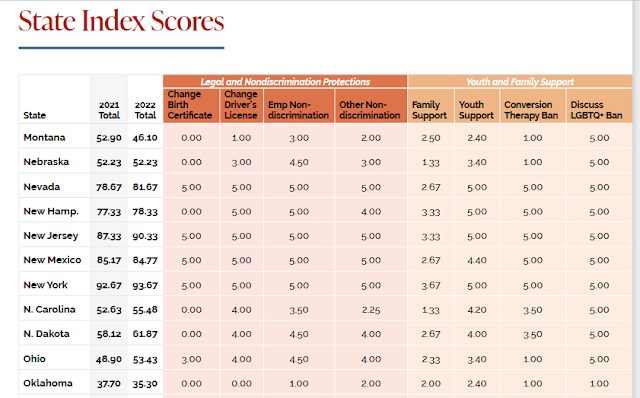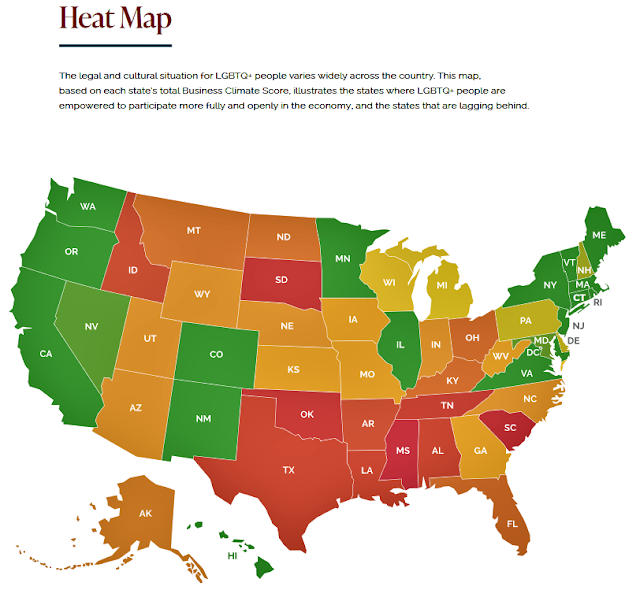The Ohio legislature has opted for anti-LGBTQ+ bills.
In April, House Bill 616 was introduced, a “divisive concepts” bill opponents have dubbed a “Don’t Say Gay” bill that would prohibit schools from teaching about “divisive or inherently racist concepts,” including sexual orientation and gender identity for students between kindergarten and third grade.
In May, House Bill 454 was introduced to ban various medical procedures for transgender or non-binary minors.
And, in June came House Bill 151, which aims to ban transgender athletes from participating in women’s sports.
“[Ohio] is on the brink of rolling back as this hateful, anti-LGBTQ+ legislation is considered by our state leaders, instead of more conversation on how we can improve our climate for LGBTQ+ folks who want to live, work and play here,” said Alana Jochum, executive director of Equality Ohio – a statewide legislative and legal nonprofit organization dedicated to furthering equality for LGBTQ+ people.
(David Rees. “Ohio equality score: Advocates say anti-LGBTQ+ bills are bad business.” NBC 4. June 27, 2022.)
Out Leadership, a global LGBTQ+ network for business leaders and companies, released its State LGBTQ+ Business Climate Index for 2022, ranking Ohio 31st in the nation.
The annual index ranks each state by assessing LGBTQ+ people’s experiences and is designed to be a tool for business leaders to advocate for equality from a business perspective.
Businesses supporting Climate Index
The index gives each state a score out of 100 points, based on 20 markers across five categories: Legal and Non-discrimination Protections, Youth and Family Support, Political and Religious Attitudes, Health Access, and Safety and Work Environment and Employment.
Each category includes markers like, “Does the state have any employment nondiscrimination policies for LGBTQ+ people?” “How supportive is the state of LGBTQ+ people who are in or want to start families?” and “Do LGBTQ+ people, particularly the most vulnerable and economically precarious, have access to health care and insurance?” For each question, Out Leadership gave the state a score out of five.
(David Rees. “Ohio equality score: Advocates say anti-LGBTQ+ bills are bad business.” NBC 4. June 27, 2022.)
The American Civil Liberties Union reports that Ohio does not have a statewide law that protects LGBTQ people from discrimination. This means that a person can still be fired, denied housing, or refused service simply because of whom they love or how they identify. Unfortunately, the Ohio legislature has been voting down LGBTQ nondiscrimination bills for the past twenty years.
As of January 4, 2021, 32 cities and 1 county in Ohio have passed local ordinances banning any LGBTQ discrimination (sexual orientation or gender identity) in employment, housing, and public accommodations, but LGBTQ Ohioans deserve more than a piecemeal approach.
Here’s the list of 35 localities banning discrimination:
Akron, Athens, Beachwood, Bexley, Bowling Green, Cincinnati, Cleveland, Cleveland Heights, Columbus, Coshocton, Cuyahoga County, Dayton, Dublin, East Cleveland, Galion, Gambier, Golf Manor, Kent, Lakewood, Medina, Newark, Oberlin, Olmsted Falls, Oxford, Portsmouth, Reynoldsburg, Sandusky, Shaker Heights, South Euclid, Toledo, University Heights, Westerville, Worthington, Yellow Springs, and Youngstown.
In 2021, Ohio approved legislation that would allow medical providers to refuse to administer any medical treatment that violates their moral, ethical, or religious beliefs.
The language was buried in a 700-page document of last-minute amendments to the state’s two-year budget bill, which Ohio Gov. Mike DeWine approved. The provision allows anyone providing medical care – from doctors and nurses to researchers and lab techs – and anyone paying for that care (namely, insurance providers), “the freedom to decline to perform, participate in, or pay for any health care service which violates the practitioner’s, institution’s, or payer’s conscience as informed by the moral, ethical, or religious beliefs.”
The bill does not allow medical professionals to deny LGBTQ people care, carte blanche; the exemption “is limited to conscience-based objections to a particular health care service.” It goes on to say that the provider is “responsible for providing all appropriate health care services, other than the particular health care service that conflicts with the medical practitioner’s beliefs or convictions, until another medical practitioner or facility is available.”
But the bill was overwhelmingly opposed by the state’s medical community. “The implications of this policy are immense and could lead to situations where patient care is unacceptably compromised,” read a letter to budget negotiators, signed by the Ohio Hospital Association, the Ohio Children’s Hospital Association, the Ohio State Medical Association, and the Ohio Association of Health Plans.
Gov. DeWine could have struck the language while signing the rest of the budget into law, but declined to do so, despite issuing 14 other line-item vetoes.
With this newly enacted language in place, a medical provider could refuse to prescribe PrEP to an LGBTQ patient looking to reduce their risk of contracting HIV, or refuse to provide gender-affirming care to trans and nonbinary patients, or puberty blockers to transgender minors. Equality Ohio called it a “license to discriminate,” and Human Rights Campaign President Alphonso David said that it jeopardizes “the medical well being of more than 380,000 LGBTQ people in Ohio.”
Local advocates have also called foul on lawmakers’ move to insert the clause last-minute into the state’s massive two-year, 2,400-page budget bill. “They know that they couldn’t pass this on its merits as a standalone bill, because literally no one is asking for this to be passed,” Dominic Detwiler, a public policy strategist for Equality Ohio told the Columbus Dispatch.
(Hannah Murphy Winter. “Ohio Allows Doctors to Deny LGBTQ Health Care on Moral Ground.” Rolling Stone. July 07, 2021.)
Conclusion
Where does Ohio go from here? I guess that depends on the political climate much more than on the human rights demands. The nationalistic movement to deny LGBTQ rights is rooted in homophobia and hatred. As you can see, it blocks progressive legislation and thwarts positive gains for this population.
And, what about the LGBTQ population in Ohio? The Williams Institute based on Gallup surveys conducted between 2015-2017, and looked at LGBT family demographics in every state and Washington D.C. Respondents who said they identified as lesbian, gay, bisexual, or transgender were considered LGBT and were not asked whether they identify under the wider umbrella term LGBTQ+.
Ohio's numbers were as follows:
- Population identifying as LGBT: 4.3%
- LGBT population with children: 30.0%
- LGBT couples with children: 17.7%
The Ohio Fairness Act – Senate Bill 119 would make it illegal in Ohio to discriminate against someone based on their sexual orientation or gender identity or expression. The legislation, sponsored by State Senators Nickie Antonio and Michael Rulli and introduced in March, 2021 has languished in the Ohio General Assembly without even sponsor testimony being held.
"Don't Say Gay" is not just about words.
Children are not being turned gay due to what they learn in school. Gender identity is a real thing and lesbian, gay, bisexual, transgender and queer children and adults exist.
Ohio bills like House Bill 327 are attempts to whitewash history just as House Bill 616 is an attempt to erase LGBTQ people.
The Columbus Dispatch Editorial Board wrote on April 5, 2022 …
“It is reprehensible that adults – in this case Republican lawmakers – want to shame and suppress children while they are developing into the people who will lead this state.
“That's the indoctrination that should outrage parents and anyone else who cares about children or the future of Ohio.
“Teachers have already come out against it, Anthony Coy-Gonzalez, Ohio's 2021 teacher of the year, calls it an attack on "authentic and honest" education.
“As Ohio continues to recover from the pandemic, the recessive bill will no doubt be condemned by businesses, those here hoping to attract young and forward-thinking talent and those looking for homes here.
“That is no small thing particularly in Columbus – the state's undeniable economic center – which also ranks among the top gay friendly metropolitan areas in the nation.
"'Our nation has strived to make good on its promise that everyone is entitled to be treated with equal dignity under the law. That is true when it comes to LGBTQ Americans, who now have the constitutional right to identify openly as LGBTQ, to marry, and to form families with children,' said attorney Roberta Kaplan who is representing National Center for Lesbian Rights on behalf of Equality Florida and Family Equality.
“Instead of following Florida down the road to oppression, Ohio lawmakers should make this a state where all kids can strive, learn and grow into healthy adults.
“By not saying gay, lawmakers are telling LGBTQ kids they are not worthy of love or liberty.”
(“Our view: Ohio's LGBTQ kids would be forced in closet with lawmaker's 'Don't Say Gay' copy.” Dispatch Editorial Board. Columbus Dispatch. April 05, 2022.)
There is a ton of work to do to achieve equality in the Buckeye State.
In February 2020, Human Rights Campaign Foundation and the Equality Federation Institute released their 5th annual State Equality Index (SEI), a comprehensive report detailing statewide laws and policies that affect LGBTQ people and their families, and assessing how well states are protecting LGBTQ people from discrimination. Ohio falls into the category, “High Priority to Achieve Basic Equality.”
While falling into the lowest category, Ohio is one of 30 states where LGBTQ Americans, their friends and families remain at risk of discrimination.





No comments:
Post a Comment